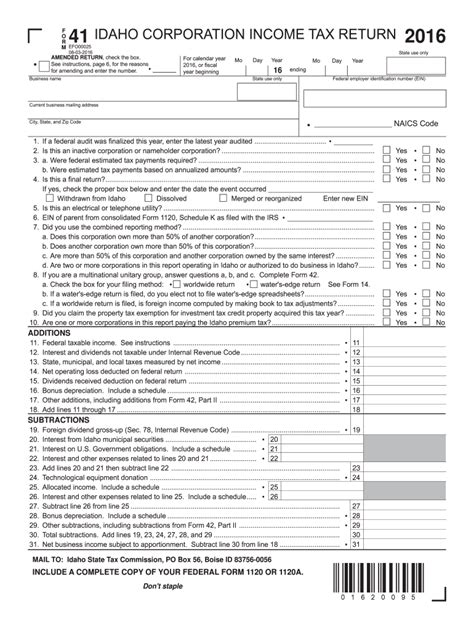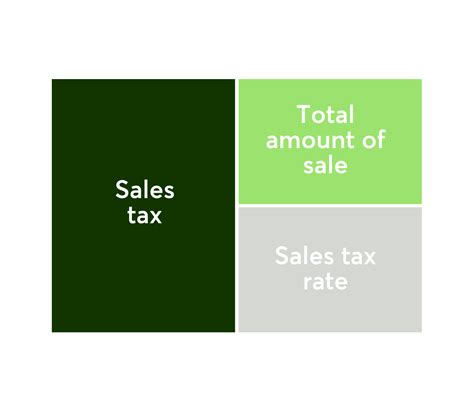The Idaho Tax Calculator Guide

Navigating the world of taxes can be a complex task, especially when it comes to understanding the unique tax landscape of a state like Idaho. This comprehensive guide aims to unravel the intricacies of Idaho's tax system, providing a detailed insight into the calculations, deductions, and strategies that can impact your financial well-being.
Understanding Idaho’s Tax System

Idaho’s tax system operates on a combination of income, sales, and property taxes, each with its own set of regulations and rates. While the state boasts a relatively low tax burden compared to many others, it’s essential to delve into the specifics to optimize your financial planning.
Income Tax: A Key Component
Idaho imposes an individual income tax, which is calculated based on your taxable income and filing status. The state operates on a graduated tax rate structure, with higher income levels attracting higher tax rates. For the tax year 2023, these rates range from 1.6% to 7.4%, depending on your taxable income bracket.
To illustrate, let’s consider a single taxpayer with a taxable income of 50,000</strong> for the year. Using Idaho's tax brackets, their income would be taxed as follows:</p> <table> <tr><th>Tax Bracket</th><th>Rate</th><th>Taxable Income</th><th>Tax Amount</th></tr> <tr><td>0 - 2,0001.6%2,000</td><td>32 2,001 - 4,0002.2%2,000</td><td>44 4,001 - 6,0003.1%2,000</td><td>62 6,001 - 10,0004.0%10,000</td><td>400 10,001 - 20,0005.1%10,000</td><td>510 20,001 - 30,0005.9%10,000</td><td>590 30,001 - 40,0006.7%10,000</td><td>670 40,001 - 50,0007.4%10,000</td><td>740 Total Taxable Income50,000</td><td>3,448
This example demonstrates how Idaho’s graduated tax system applies different rates to different income levels, resulting in a total tax liability of $3,448 for our hypothetical taxpayer.
Sales and Use Tax: A Consumer’s Perspective
Idaho also levies a sales and use tax on the sale of tangible personal property and certain services. The state’s general sales tax rate is 6%, with additional local option taxes ranging from 0.25% to 1.5%, depending on the county. This means that the total sales tax rate can vary across the state.
For instance, let’s consider a purchase of a new television worth 1,000</strong> in a county with a <strong>0.5%</strong> local option tax. The sales tax calculation would be as follows:</p> <table> <tr><th>Sales Tax Rate</th><th>Tax Amount</th></tr> <tr><td>State Sales Tax (6%)</td><td>60 Local Option Tax (0.5%)5</td></tr> <tr><td>Total Sales Tax</td><td>65
In this scenario, the consumer would pay a total sales tax of 65</strong> on the television purchase, bringing the total cost to <strong>1,065.
Property Tax: A Homeowner’s Concern
Property taxes in Idaho are primarily assessed and collected at the county level, with each county setting its own tax rate. These rates are applied to the assessed value of the property, which is determined by the county assessor. The tax is typically paid annually and can vary significantly based on the location and characteristics of the property.
As an example, let’s consider a residential property in Ada County with an assessed value of 300,000</strong>. The county's tax rate for the year is <strong>0.8%</strong>. The property tax calculation would be:</p> <table> <tr><th>Property Tax Rate</th><th>Assessed Value</th><th>Tax Amount</th></tr> <tr><td>County Tax Rate (0.8%)</td><td>300,0002,400</td></tr> </table> <p>This homeowner would be responsible for paying <strong>2,400 in property taxes for the year.
Deductions and Credits: Optimizing Your Tax Position

Idaho offers various deductions and credits to help reduce your tax liability. These can be particularly beneficial for certain taxpayers, such as those with significant medical expenses, those caring for dependents, or those investing in the state’s economy.
Standard Deduction vs. Itemized Deductions
Idaho taxpayers have the option to choose between taking the standard deduction or itemizing their deductions. The standard deduction for the tax year 2023 is 2,450</strong> for single filers and <strong>4,900 for joint filers. This means you can deduct this amount from your taxable income without providing specific details of your expenses.
However, if your eligible expenses exceed the standard deduction, it may be beneficial to itemize. Common itemized deductions in Idaho include medical expenses, charitable contributions, state and local taxes, and mortgage interest.
Credits: A Potential Tax Saver
Idaho provides several tax credits that can reduce your tax liability. Some notable credits include:
- Child and Dependent Care Credit: Available to taxpayers with qualifying expenses for childcare or dependent care.
- Earned Income Tax Credit (EITC): A federal credit with Idaho offering an additional state credit for eligible low- to moderate-income taxpayers.
- Energy Tax Credit: Offers a credit for the installation of energy-efficient equipment in homes or businesses.
- Research and Development Tax Credit: Encourages businesses to invest in research and development activities.
These credits can significantly reduce your tax bill, so it’s essential to understand your eligibility and take advantage of them where possible.
Tax Strategies: Planning for Success
Effective tax planning can lead to significant savings and a more efficient use of your financial resources. Here are some strategies to consider when navigating Idaho’s tax landscape:
Maximize Deductions and Credits
Review your financial situation and expenses to ensure you’re taking advantage of all available deductions and credits. This could involve keeping thorough records of eligible expenses, such as medical bills or charitable contributions, to maximize your itemized deductions.
Consider Tax-Advantaged Investments
Idaho offers several tax incentives for investing in the state’s economy. For instance, the Idaho Preferred Tax Credit provides a credit for investments in Idaho-based companies. Similarly, the Idaho Strategic Fund Tax Credit offers incentives for businesses investing in certain economic development projects.
Utilize Retirement Accounts
Contributions to retirement accounts, such as 401(k)s or IRAs, can reduce your taxable income in the year they’re made. Additionally, the growth within these accounts is typically tax-deferred, meaning you don’t pay taxes on the earnings until you withdraw the funds in retirement.
Strategic Timing of Purchases
If you’re considering significant purchases, such as a new home or vehicle, timing can be crucial. By making these purchases strategically, you may be able to leverage tax deductions or credits to reduce your overall tax liability.
Future Implications and Trends
As Idaho’s economy continues to evolve, so too will its tax landscape. While the state has traditionally maintained a relatively low tax burden, there are ongoing discussions and proposals that could impact the tax system in the future.
Potential Tax Reforms
Some proposed reforms include flattening the income tax rate structure, introducing new tax credits or deductions, and potentially eliminating certain taxes. These reforms aim to simplify the tax system, encourage economic growth, and provide tax relief to residents and businesses.
Economic Impact and Tax Policy
The relationship between economic growth and tax policy is complex. Idaho’s tax system plays a crucial role in shaping the state’s economic environment, influencing investment decisions, business operations, and consumer spending. As such, any changes to the tax system can have significant implications for the state’s economy and its residents.
Conclusion

Understanding Idaho’s tax system is a crucial step towards effective financial management. By grasping the intricacies of income, sales, and property taxes, as well as leveraging deductions and credits, taxpayers can optimize their financial position. This guide aims to provide a comprehensive overview, but it’s always advisable to consult with a tax professional for personalized advice tailored to your specific circumstances.
How often are Idaho’s tax rates updated or changed?
+Idaho’s tax rates are typically reviewed and updated annually to account for inflation and other economic factors. However, significant reforms or changes to the tax system may occur less frequently, often requiring legislative approval.
Are there any special tax considerations for remote workers or digital nomads in Idaho?
+Remote workers and digital nomads may have unique tax considerations depending on their residency status and the nature of their work. It’s essential to understand the tax implications of working remotely in Idaho, especially if you’re not a resident of the state.
What is the process for appealing a property tax assessment in Idaho?
+If you disagree with your property tax assessment, you can file an appeal with your county’s Board of Equalization. The process typically involves submitting a written appeal, providing evidence to support your case, and potentially attending a hearing. It’s advisable to consult with a tax professional or the county assessor’s office for guidance.



